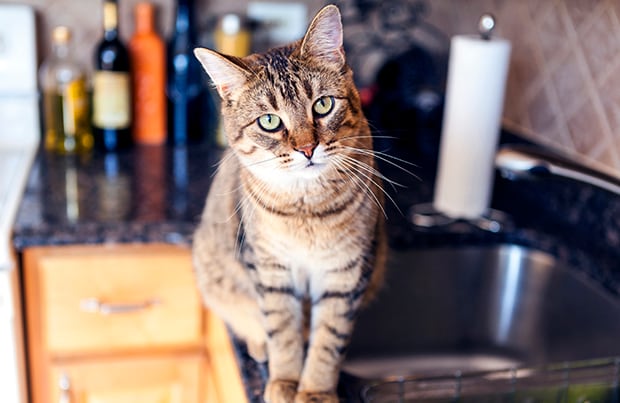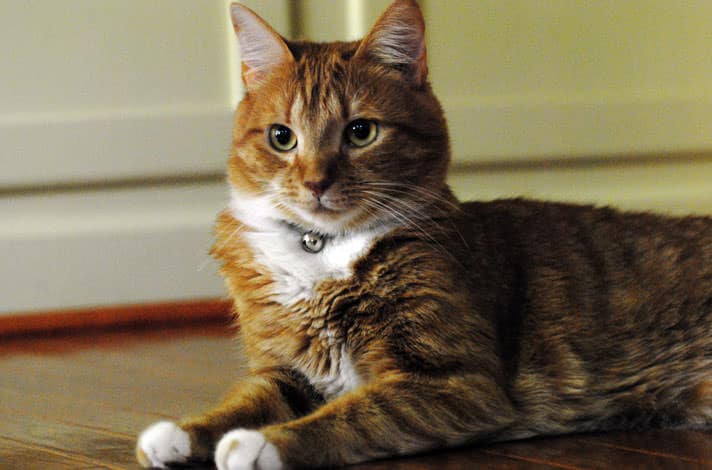Scolding your cat might be a natural reaction when you catch him misbehaving, but that doesn’t mean it’ll get you anywhere. In fact, scolding often backfires, worsening the problem or at least seriously confusing your cat.
Here are a few reasons why scolding your cat doesn’t work and what to do instead:
Cats Aren’t Mind ReadersF
Scolding might make sense to you, but that doesn’t mean it does for your cat. In fact, pets often have no idea what just happened or why you’re yelling at them.
“We don’t scold cats because no matter how carefully [you choose your] words, cats still don’t understand English,” says Shawn Simons, a feline behaviorist and and feral cat specialist. “Instead, it is important to understand why a cat may be acting out and then problem solve from that starting point.”
Even if your cat does get the message through scolding that scratching the furniture is bad, he’s more likely than not to learn to simply make sure you are not around before he starts scratching his nails on your pricey couch again. In other words, rather than learning not to do the behavior at all, your cat will learn to do the undesired behavior when you’re not around to scold him.
Your Timing Will Be Off
If you scold your cat while you are in the process of removing him from the counter, he may associate the scolding with being picked up rather than being on the counter itself, says Irith Bloom, a certified animal trainer and a certified behavior adjustment training instructor
“While it may be obvious to you that you want the cat to stop jumping on the counter, the cat may perceive the scolding as having to do with a noise that coincidentally happens at the same time, or some other unrelated event,” Bloom says.
In fact, Dr. Jonathan Quan points out that scolding is generally pointless because it rarely happens at the same time the “bad” act is happening.
“Unless punishment is performed within seconds of the act we are punishing for, your cat may not know exactly why it is being punished,” Quan says.
Scolding Doesn’t Solve the Problem
Cats repeat a behavior because there’s a payout for them. For example, your cat might be pushing things off the table because it’s fun or jumping on the countertop because it offers the best view out of the kitchen window.
Rather than scolding your cat for doing something that feels natural, change the environment and provide him with an alternative.
If you don’t want your cat getting on your countertop, make them a negative space to be, says Simons, founder of Kitty Bungalow Charm School for Wayward Cats. You can do this by placing double sided tape or aluminum foil on the countertop to make the space uncomfortable. Once they have learned they don’t like it there, you can take away the deterrents, says Simons.
“But note that most cats like to get ‘up’ on things, [so] make sure that you have plenty of cat-friendly places for the cat to go to,” she adds.
Adding a window perch for a great view or getting a few interactive toys for your cat to bat around might be a great way to start redirecting his energy.
It May Change Their Behavior Around You
Too much scolding—and just one time can be too much when it comes to cats, according to Bloom—can cause your cat to feel uneasy around you.
“Think about a boss or teacher who used to scold you a lot, and not always in ways that made sense,” says Bloom. “Did you like that person, or did you feel on edge whenever that person was around?”
Scolding can make your cat jumpy and sensitive to movement or the presence of people, as he might be constantly on edge waiting for you to say something. “Scolding may teach the cat that you are a scary person,” says Bloom.
You can increase your bond with your cat and avoid uneasiness by using positive reinforcement instead.
“Food is a main motivation we often think of, but some cats are motivated by attention, affection, or play,” says Quan.
Find out what motivates your cat and use it to teach them a trick or to help them learn the behaviors you want them to do. Then, Quan says, when they misbehave, use that trick to help redirect the behavior.
It Can Encourage Bad Behavior
Even though it’s negative attention, scolding your cat is still giving him attention, something he likely desires.
“Just like a three-year-old child may do something ‘bad’ to get mom or dad to look, your cat may do a behavior that is sure to get scolding because it’s a way to get your attention,” Bloom says. “That means that by scolding the cat, you may actually be encouraging him to do more of the bad behavior.”
This reaction highlights one of the major problems with scolding: it doesn’t teach your cat what behaviors you would like him to do. In fact, it’s just a confusing directive to not do something without a clear direction of what to do instead.
“It’s a much better policy to teach the cat where to be (like on a bed or a mat instead of a counter or table), rather than saying ‘not there, not there, not there’ all the time,” says Bloom.
If you do see your cat doing something inappropriate, Bloom recommends redirecting him in a positive way. For example, Bloom recommends calling your cat’s name or do something else to gently get your cat’s attention, and then offer cat treats or a toy to play with.
“This will distract your cat from whatever misbehavior he was doing,” says Bloom. “You can then spend a few minutes engaging in play or petting with your cat, by which time the cat will be much less likely to return to the previous, annoying behavior.”

Diana Bocco is a full-time writer and adventurer, whose work has been published in DiscoveryChannel.com, Yahoo!, & Popular Mechanics.
Share:








